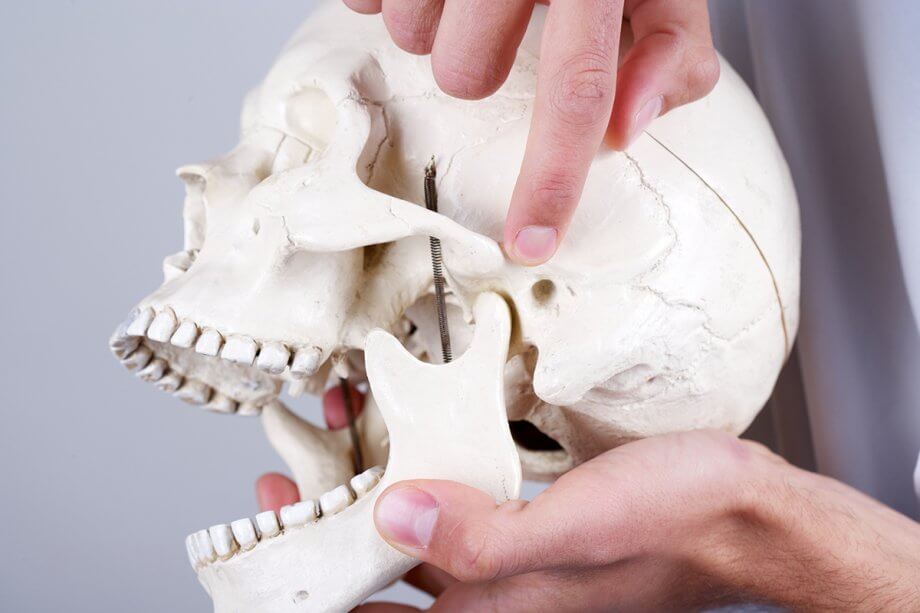Individuals who have a problem in their temporomandibular joint may experience a wide range of symptoms, based on the cause and severity of the condition. Mild cases of TMJ disorder may only produce a clicking or popping sound. Others may experience discomfort or tenderness in the jaw. More severe cases of TMJ can cause aching in the face, neck, shoulders, ears, and head. It may also be painful to talk, eat, or yawn. Some people may experience dizziness, impaired balance, or ringing in the ear (tinnitus). The pain caused by TMJ disorders will vary based on the root cause of the condition.
Types of TMJ Disorders
Temporomandibular joint disorders, also known as TMDs are a collection of disorders, each with its own causes and symptoms. There are three main types of TMJ disorders.
Myofascial Pain
Myofascial pain is the most common type of TMJ disorder. It produces symptoms including pain in the muscles that control your jaw function, and pain in your neck and/or shoulder muscles. It is caused by inflammation in the connective tissue which covers your muscles. This type of TMJ disorder often results from overuse or misuse of the jaw. It is more commonly found in women than in men.
Overuse or misuse may include teeth grinding or clenching, poor posture, misalignment of teeth, stress, anxiety, or even fatigue. Myofascial pain caused by TMJ may be treated with a wide range of treatments including, mouthguards, various exercises (physical therapy), and anti-inflammatory medications.
Internal Derangement of the Joint
This type of TMD results from a dislocated disc in the joint, a dislocated jaw, or an injury to the condyle. In the temporomandibular joint, the disc serves as a cartilage cushion between the skull and the head of your jaw bone. The condyle is the rounded end of the jaw bone. If either is displaced you may experience clicking and popping in your jaw along with joint pain.
Degenerative Joint Disease (Arthritis)
Just like you can develop arthritis in your shoulder joints, knees, joints of your spine, and everywhere else, you can develop arthritis in the temporomandibular joint. Arthritis is the umbrella term for a condition in which a joint becomes inflamed and therefore aches. Both osteoarthritis and rheumatoid arthritis can ultimately be responsible for TMD.
Treatment for TMJ Pain
If you’ve been diagnosed with TMJ, your treatment will depend in large part on the type of TMJ you have, and the severity of your pain. Treatments for TMJ include:
- Lifestyle Modifications
Your dentist may recommend that you stop chewing gum, and switch to soft foods temporarily to allow the inflammation to subside. You may also be told to limit wide yawning, and any loud singing or yelling that requires you to open your mouth widely. Likewise, because stress, anxiety, and extreme fatigue can contribute to your pain, your dentist may talk with you about relaxation techniques to help alleviate tension.
- Icing Your Jaw
Icing your jaw can help to reduce inflammation, so your dentist may recommend a routine of icing your jaw.
- Anti-Inflammatory or Muscle Spasm Medication
Non-steroidal anti-inflammatory medications (NSAIDs) may be prescribed to reduce inflammation in your joints. If the inflammation is caused by muscle spasms in the jaw, you may also be prescribed a muscle relaxer for a brief period.
- Splints (Bite Plate)
A splint, also known as an oral appliance, bite plate, or mouth guard may be created for you to help reduce teeth grinding or clenching.
- Physical Therapy
Your dentist may prescribe certain exercises for you to do with your jaw on a daily basis. These are typically gentle muscle stretching and relaxation exercises.
- Botox Injections
Botox works by disengaging certain muscles, thereby reducing tension and spasms. Botox injections may help relieve tension in the jaw, aiding in reducing other symptoms including headaches, jaw-locking, and neck pain.
- Surgery
Surgery will only be recommended if you’re suffering from severe pain, and all conservative, non-surgical techniques have failed to reduce your pain.
Treatment for TMJ Pain
At San Francisco Dental Wellness, Dr. Chris Chui treats patients suffering from TMJ disorder. Named a “Best of the Bay” dentist, and included in the prestigious “America's Top Dentist” list, Dr. Chui is a frequent lecturer and dental expert featured on television programs throughout the nation. Request an appointment with Dr. Chui, or call 415-781-1944

